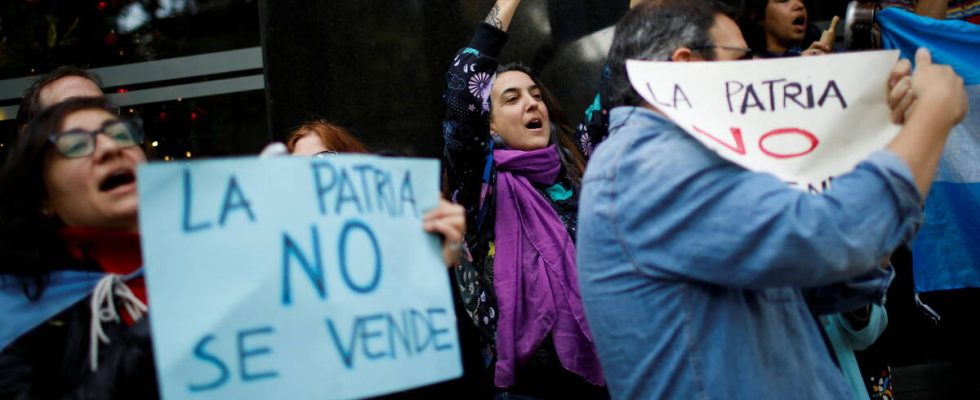Opponents in the street hit in the wallet. The spokesperson for the Argentine presidency announced Friday December 22 that the organizers of the first rally against the government of ultraliberal President Javier Milei, Wednesday in Buenos Aires, will have to cover the costs linked to the mobilization of security forces on this occasion.
The cost of these expenses, which include the mobilization of four security forces – federal police, municipal police, airport police and gendarmerie – was estimated at 60 million pesos, or nearly 70,000 euros. It is “the bill that will be passed on to social movements”will be “called upon to assume responsibility for this expenditure which does not correspond to citizens”added spokesperson Manuel Adorni.
A few days after the inauguration of the ultraliberal president, thousands of people demonstrated in the center of the Argentine capital at the call of left-wing organizations. Denouncing the government’s austerity program, the demonstrators were surrounded by a large security system, criticized by the organizers. “It reminds me of the dictatorship”commented Eduardo Belliboni, leader of the Polo Obrero (Workers’ Pole) organization.
An anti-demonstration law in preparation, social assistance for protesters also in the sights
The device had been personally supervised from the headquarters of the federal police by the president and his Minister of Security, the former right-wing presidential candidate, Patricia Bullrich. “The force used will be the minimum necessary, but proportional to the resistance”she indicated last week, adding that “the invoice for this device will be sent to the responsible organizations or individuals. The State will not pay for this use of security force.” Argentina, and greater Buenos Aires in particular, are the scene of hundreds of demonstrations with traffic main cuts each year. Particularly in December, a month associated in the memory of Argentines with the major demonstrations of 2001, which left 39 dead and half a thousand injured during the public debt crisis.
Patricia Bullrich, who returns to her position already occupied between 2015 and 2019 under the presidency of liberal Mauricio Macri, announced a law to prevent “cuts, pickets, roadblocks”, which affect the activity and “prevent Argentines from living in peace”. The new protocol plans to increase the radius of action of the police, who would intervene against any street blockages in order to free up traffic areas. “More than a limitation on the use of police force, it is an authorization to exercise violence against demonstrators” since then “criminalized”, had denounced the Center for Social and Legal Studies (CELS) on December 14, with the announcement of this new security protocol.
As for her colleague Sandra Pettovello, Minister of Human Capital, she warned at the start of the week in a brief message broadcast on his X account (formerly Twitter) that “those who cut the streets will not be paid”, specifically targeting “the beneficiaries of social plans”. In other words, no social assistance for the demonstrators. According to the Social Observatory of the Catholic University of Argentina, 40.1% of the country’s population is poor, while one in two inhabitants receives some form of aid from the state, either directly or through intermediary of an organization.

